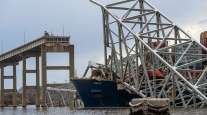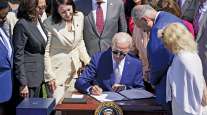A Bipartisan Infrastructure Plan
The voters have spoken, and analysts and pundits are busily trying to explain the shifts in the political landscape that will result from the overwhelming Republican victory.
But one immediate potential gain that emerged from the cacophony of chatter in the wake of the election is a chance to move transportation and infrastructure improvement programs along quickly.
As President Obama was acknowledging the “shellacking” he and fellow Democrats suffered on Nov. 2, he proposed that one area that the parties could work together on could be transportation infrastructure.
Obama said, “I think the proposal that I put forward with respect to infrastructure [spending $50 billion on highway and other transportation projects as part of a six-year program] is one that historically we’ve had bipartisan agreement about.”
In September, and again in October, Obama proposed to spend $50 billion to create jobs and improve the nation’s transportation infrastructure that he has now suggested Republicans can join in supporting.
So far during his tenure in the White House, Obama created a $27.5 billion pot of cash for roads and bridges as part of the federal government’s initial economic stimulus plan soon after taking office, but he has resisted congressional attempts to pass a six-year reauthorization of the traditional highway funding bill.
The chief supporter for the highway bill was Rep. James Oberstar, chairman of the House transportation committee, who tried unsuccessfully to convince the White House to change its tune. Oberstar, an 18-term legislator from Minnesota, was one of the victims of the Republican landslide last week.
In an interview with Transport Topics last week, Oberstar’s presumed successor as chairman of the transportation committee, Rep. John Mica (R-Fla.), offered some hope of movement toward a highway bill.
“Among my top legislative priorities will be passing a long-term federal highway and transit reauthorization . . . ,” Mica said.
He added that his “primary focus” would include “speeding up the process by which infrastructure projects are approved and freeing up any infrastructure funding that’s been sitting idle.”
Several transportation analysts said they were hopeful the parties could agree quickly on transportation spending.
As American Trucking Associations said last week, if the president and the new congressional leadership “want to work together, an infrastructure bill that would put people to work would certainly be a great place to start.”




